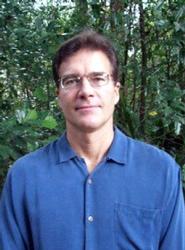
Thiele thanked his assembled listeners and quickly leapt to the point, impressing the point that while the students presenting at the colloquium had proven their desire to give more than lip service to environmental and social change, "…one in 10 Americans – and a higher percentage of college students – claim membership to a group committed to environmental improvement, and yet many remain simple members of these organizations without acting on their convictions." Thiele asked his listeners to follow the examples of the presenting students, whose projects ranged from a service project to improve dental health care in Ghana to a study of women's reproductive health issues in Afghanistan, and to change the world of tomorrow with their actions.
Thiele then expounded on what he called, "a difficult but obvious truth – that social and environmental change often conflict at a fundamental level." Thiele cited examples from the third world (a farmer at the edge of the Amazon rain forest, for example, who claims he must cut down trees to feed his family) and the first world (where money for social welfare programs is often taken out of the budgets of environmental programs and vice versa). Over and over in his talk, Thiele emphasized a central theme, also the title of his presentation: "You can't do just one thing." Thiele deftly pointed out that, just as Newton has said that for every action there is an equal and opposite reaction in physics, "… there is an equal and opposite reaction for every we take socially and environmentally as well."
To combat the problems he had outlined, Thiele emphasized research and long-term solutions. Once again he turned to the student speakers, describing them as conducting exactly the kinds of studies and projects needed to understand the problems the world faces in a scientific light as well as a social one. Thiele also pointed out that much research has already been done, and solutions are usually readily apparent but painful. (For example, the farmer on the edge of the Amazon could pick tropical fruit in a sustainable manner instead of cutting the trees, and the money for first-world projects could come from reducing the military budget or lowering the costs of central government agencies). "Once again," Thiele said, "the onus is on you. Go out and do something. Find the solutions, yes. Become informed, yes. But then have the guts to act on your research and knowledge and carry out positive change in the world."
The Hamilton Diversity and Social Justice Project has already sent, or inspired, many students to go on projects exemplifying Thiele's exhortations and, from the exuberant response Thiele received, more will follow.
-- by Elijah Lachance '10
Posted September 10, 2007
